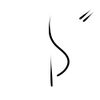Contionary:suri: Difference between revisions
Jump to navigation
Jump to search
Created page with "==Avendonian== ===Etymology 1=== {{av-a-0|suro|masculine plural positive}} ===Etymology 2=== {{av-npl-0|m|suro}}" |
|||
| (7 intermediate revisions by the same user not shown) | |||
| Line 4: | Line 4: | ||
===Etymology 2=== | ===Etymology 2=== | ||
{{av-npl-0|m|suro}} | {{av-npl-0|m|suro}} | ||
==Soc'ul'== | |||
{{wacag|bristle}} | |||
===Etymology=== | |||
{{rfe|qsc}} | |||
===Pronunciation=== | |||
* {{IPA all|qsc|[su˧ri˧]}} | |||
===Noun=== | |||
{{qsc-n|3}} | |||
# bristle, feeler, antenna, whisker, vibrissa, barbel | |||
#: {{ux|qsc||}} | |||
===Derived terms=== | |||
{{col-auto|qsc|surijí|suriz'i|īci suri|bibin suri}} | |||
Latest revision as of 04:44, 17 February 2026
Avendonian
Etymology 1
Adjective
suri
- masculine plural positive of suro
Etymology 2
Noun
suri m pl
- plural of suro
Soc'ul'
| Wacag logograph |
|---|
 |
Etymology
(This etymology is missing or incomplete. It will be most likely added at some point in the future.)
Pronunciation
Noun
suri 3 (plural/indefinite ez'e suri)
- bristle, feeler, antenna, whisker, vibrissa, barbel
- (please add the primary text of this usage example)
- (please add an English translation of this usage example)